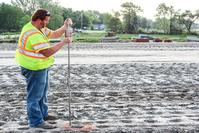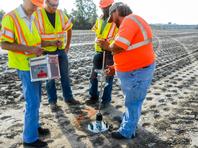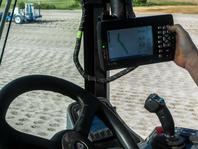Intelligent Compaction Technology for Quality Control
Both IC and DCP data were collected on an earthwork construction project in Kokomo on US 31/US 35, completed in August 2013. Based on the success of this project, INDOT is working to implement this innovative technology. A special provision for IC construction has been revised and another project on US 50 in 2014 is being planned.
How It Works
The intelligent compaction (IC) roller measures and records the stiffness of the soil during the compaction process for “real-time quality control” of compacted soil. This innovative tool is equipped with a global positioning system to create a map that shows the coverage and relative stiffness across the entire surface of each lift of soil. This allows soil roller operators to better gauge whether soil is being under or over compacted.
The system controller on each roller is preloaded with a 3-D model of the project to correlate all coordinates, elevations, and stationing. Color coding of the real time information on the operator’s control screen indicates soft spots in the soil, allowing operators to know exactly where they need to roll again for optimal compaction and technicians know which areas may need further evaluation.



